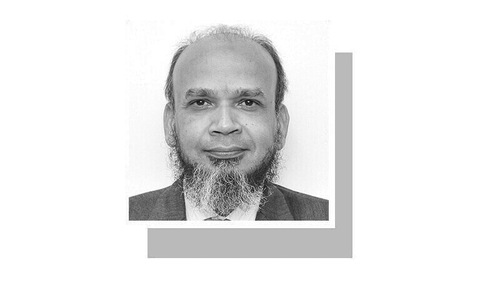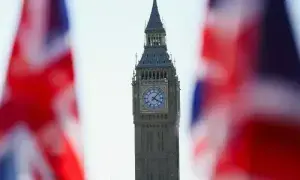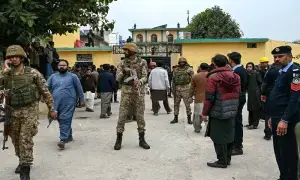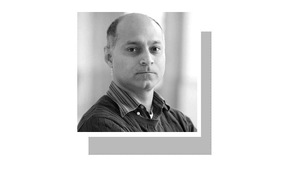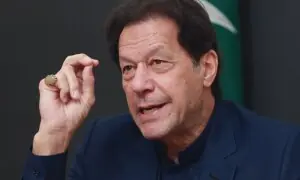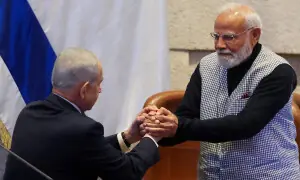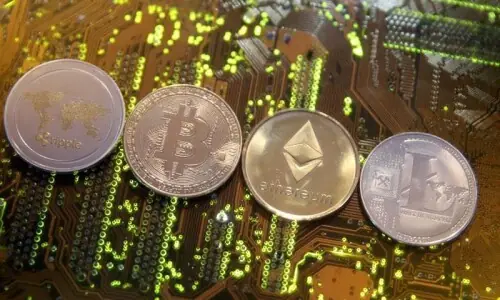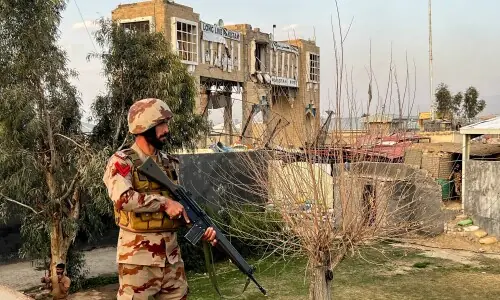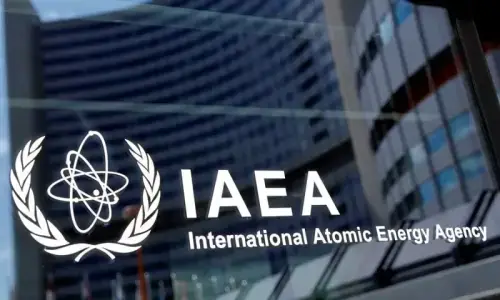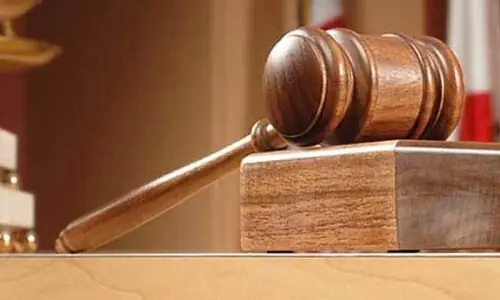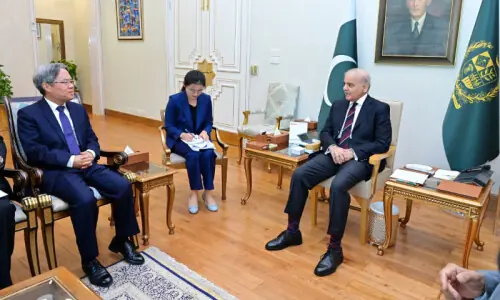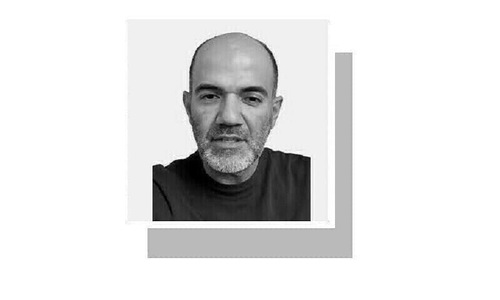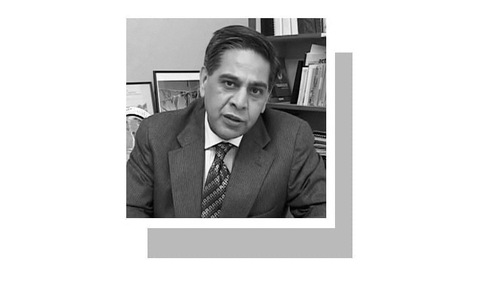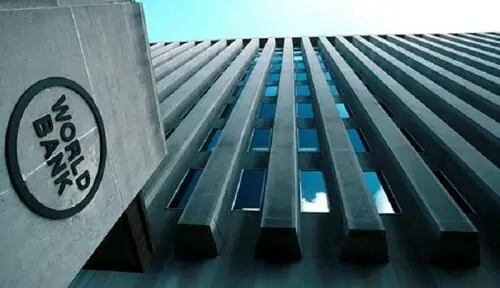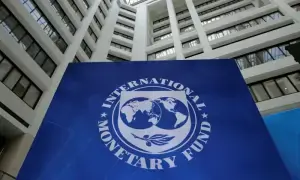What has prompted the move?
MR VAJPAYEE’S recent initiative to start a “decisive and conclusive” dialogue with Pakistan to end decades of hostility between the two neighbours has been widely welcomed in this country. However, in order to respond properly to the move, it is necessary to examine whether the initiative is merely a tactical manoeuvre or a strategic shift in New Delhi’s approach to bilateral relations with Islamabad.
Mr Vajpayee has taken the initiative in the last year of his term. Speaking in the Indian parliament he made it clear that it was his “last and final try” and that his friends had put him in “the dock” for making that move. Body language never lies and there was a definite ring of sincerity in what he was saying. Also, there was no question that his was a sure-footed performance. But the important question that remains unanswered is: what has prompted him to make this move? Until May 2, India did not want to have anything to do with Pakistan — no talks, no contacts, no official visits, no overflights, no cricket tours, no full diplomatic relations and so on and so forth.
An equally surprising development is that Mr Vajpayee has succeeded in managing the hardliners in his party who will not be able now to exploit anti-Pakistan sentiments and raise the Hindutva issue as two vote catchers in the coming state elections and the general elections next year if they are seen shaking hands with the Pakistanis. Even his hawkish Deputy Prime Minister L. K. Advani’s comments now reflect a more conciliatory approach towards Pakistan. Also, the RSS, BJP’s extremist ideological wing, is not opposed to Mr Vajpayee’s initiative, at least not openly. Some or all of the following factors may have combined to facilitate India’s new thinking on relations with Pakistan.
India’s stance that it would have nothing to do with Pakistan until Islamabad puts a complete end to what New Delhi calls “cross-border terrorism” could not be sustained indefinitely. It was an unreasonable stance and did not enjoy any support outside India.
India’s global ambitions have been kept in check because of its continuing confrontation with Pakistan. The unresolved dispute over Kashmir has kept New Delhi tied down to the narrow confines of the Indian subcontinent and drained its political, diplomatic and military energies in coping with the problems of insurgency in Kashmir. Only by solving the festering dispute and disengaging itself from the on-going confrontation with Pakistan can India liberate itself to realize its age-old ambition of playing a major role in regional and world affairs.
Mr Vajpayee has mentioned the Iraq war as one of the reasons behind his initiative. The American victory in Iraq has appreciably increased Washington’s clout not only in the Middle East but also in South Asia.. The Indian leadership believes that it will no longer be feasible for Islamabad to hold off Washington’s pressure to completely withdraw its support from the low-intensity war across the Line of Control.
The ISI’s director-general General Ehsan’s current high-level talks in Washington, President Musharraf’s Washington visit next month and Vice-President Dick Cheney’s invitation to Mr L.K. Advani to visit Washington, conveyed by Deputy Secretary of State Artmitage during his recent New Delhi visit, are not unrelated to Mr Vajpayee’s peace initiative and the positive response from Pakistan. It appears that some sort of coordinated moves are underway, with the Americans playing a covert third-party role in the background.
It may be recalled that on his way to the subcontinent, Mr Armitage stopped over in London to meet Mr Vajpayee’s Principal Secretary Brajesh Mishra, who is also the National Security Adviser of the Indian prime minister. After the end of the Iraq war, Mr Mishra advocated an India-Israel-US alliance that would “have the political will and moral authority to take bold decisions in extreme cases of terrorist provocation.” Mr Mishra had met President Bush recently in Washington.
It appears that the Clinton era proposal for an Indo-US strategic alliance has been revived after the Iraq war. But it will be difficult for New Delhi to play an effective role in the Indian ocean and the Gulf in the face of on-going confrontation with Pakistan. It is within the realm of possibility that the Americans have promised their support to New Delhi’s ambition to get a permanent seat on the Security Council if India and Pakistan succeed in resolving their long-standing problems.
Like any political leader, Mr Vajpayee also suffers from the common human weakness: the desire to carve out a niche in history for himself for creating harmony between India and Pakistan. Domestic politics may have also played some role in Mr Vajpayee’s peace initiative. BJP has so far thrived on emotive issues like Rath Yatra and Babri Masjid. But the Gujarat model, based on religious pogrom and Pakistan-bashing, did not pay off in the Himachal Pradesh elections, won by the Congress (I) which may have led to some serious rethinking of strategy on the part of BJP leadership for the coming state elections and the next year’s general elections.
Mr Vajpayee’s peace initiative may have far-reaching implications for BJP’s internal and India’s domestic politics. If his move gathers momentum and talks with Pakistan make progress, Vajpayee may lead the BJP in the 2004 general elections on a more moderate plank. Conversely, he will lose support within his party if Pakistan does not stop supporting the low-intensity war in Kashmir and does not close down its support facilities on its side of the territory as promised.
The above analysis shows that Vajpayee’s peace initiative is more than a tactical move and may have been prompted by a number of factors implying a strategic shift in the Indian approach. Pakistan’s response should, therefore, be appropriately balanced. Islamabad should continue to proceed on the path it has wisely chosen after the Vajpayee offer and should not allow the hard-liners to retake the stage and push the country to the brink.
After the hand of friendship extended by the Indian prime minister, the onus squarely lies on our shoulders to demonstrate that we shall keep our promise of taking every possible action to put an end to all cross-border intrusions. We should seriously take Armitage’s pointed remark that his country wanted “all violence to end” and was concerned about “all civilian deaths” in Kashmir. We should also keep in mind that the Hizbul Mujaheedin, the largest indigenous Kashmiri group, which has never done any harm to US interests, has been placed by the US on its designated list of foreign terrorists. This is a clear signal to Islamabad that Washington is not prepared to buy the distinction between terrorist and freedom fighter.
Now when diplomacy seems to be picking up steam, both countries need to be patient in dealing with each other. The decision-makers in both the capitals should keep in mind that the past two summits failed because there was no genuine give and take. Both Musharraf and Vajpayee need their domestic constituencies to back them up because none of them can unilaterally give anything away. The progress in talks is likely to be slow but even slow progress will gradually build up domestic support for a real rapprochement between the estranged neighbours. But for that patience and sustained dialogue are a must.
The writer is a former ambassador.
Shadow over the oil fields
THE Bush administration is becoming its own enemy in Iraq. Secretary of State Colin L. Powell, White House spokesman Ari Fleischer and other top-ranking officials have clearly stated that the country’s oil fields will belong to Iraqis.
But a May 2 letter from the Army Corps of Engineers to Rep. Henry A. Waxman, D-Calif., indicates that it has awarded a no-bid contract to a subsidiary of Halliburton Co. called KBR to run the oil fields until August — and maybe longer.
The administration has revealed as little about the contract as possible, a withholding of information that is compounded by Vice President Dick Cheney’s long-standing ties to Halliburton. The contract was issued March 8 but not disclosed until March 24. Then the corps revealed April 8 that the contract was worth up to $7 billion.
All along, the administration has left the impression that the no-bid contract was only for extinguishing oil wells and repairs. And Halliburton gave no indication that it was doing anything more than putting out oil fires. Now the corps is indicating that the company will basically operate the oil fields.
It also says the “best estimate” for awarding a new contract is “approximately the end of August” but the current contract could last until January 2004. The corps is also preparing a new, long-term contract for operating the fields. Why? Aren’t the Iraqis supposed to do this themselves? Shouldn’t they at least be the ones to cobble together the contracts?
The administration’s failure to be forthright about the bid is creating the impression of impropriety. KBR may indeed be the best company to work on the oil fields, but the no-bid contract didn’t give anyone else a chance to present their capabilities. What’s more, the company has a history of overcharging the government.
In 1997, the General Accounting Office found that the firm had billed the Army for questionable expenses. Last year, KBR paid $2 million in fines to resolve fraud claims over work at a military base.
Now the Halliburton subsidiary is being rewarded with potential control over Iraqi oil fields. The administration may be guilty of cronyism or nothing more than having murky plans for Iraq. Either way, it needs to quickly resolve the impression that it’s grabbing Iraq’s oil fields for American companies.
—Los Angeles Times
Understanding the Iraqi Shia
IT is mistakenly believed that because Iraqi Shias, despite their 60 per cent majority, have suffered enormously at the hands of the erstwhile Baathist regime, they will become a ready conduit for forming a post-Saddam polity sympathetic to their Iranian brethren-in-faith. Nothing could be further from the truth. The very premise is too simplistic and ignores the many factors directly related to Iraqi Shias’ historical and intrinsic inability, to respond to a challenge of this magnitude.
Whereas Iran, since its adoption of the Shia faith under the Safavids (1501 AD), gradually gave the clergy an increasing role in the running of the community affairs culminating in the Islamic revolution of 1979, Iraqi Shias have known no such political activism on the part of their religious establishment. This is despite the fact that the Shia faith in Iraq predates the Shia faith in Iran by nearly a millennium.
The Fiqh-i-Jafari was not born in Iraq, the traditional home of the leading Shia seminaries in Hilla, Najaf and Samarra dating back to the early 8th century AD, but in the Safavid Iran. This is because the Fiqh was believed to be a requirement of the state and not of the community by the traditional Shias. The Safavids, therefore, imported Shia ulema from Bahrain and Lebanon who laid down the precepts of the Fiqh for them.
Iraqi seminaries, instead, have remained the academic cradles in which the Shia faith took time to grow and move forward. It took the Iraqi ulema almost 200 years of fierce debate before they resolved the issue of the spiritual leadership of the community in the absence of a righteous imam. The Usuli school, which stood for handing over that role to the learned scholar, the Marja’al Taqleed, won only by a thin margin with the stringent condition attached to the Usuli position that the spiritual leadership shall not assume temporal/political leadership. The assumption of both the spiritual and temporal leadership and its exercise remains the exclusive domain of the innocent righteous imam, according to the traditional Shia position.
The Iraqi ulema, to this day, have stuck to this theological position, with the late Grand Ayatullah Abul Qassem Al-Khoei actually going on record saying that he did not find Ayatollah Khomeini’s theory of the Velayat-i-Faqih (leadership of the learned scholar) acceptable because it included the exercise of temporal authority.
The Shia religious endowments in Iraq have focused their energies on providing a spiritual leadership that has only extended to carrying out charitable works involving community welfare and general well-being supported by the Zakat and Khums donations made to the seminaries by the community. Political leadership and active politics, thus, remain the domain of the non-cleric Iraqi Shias.
This position was reiterated by the recently assassinated Iraqi cleric, Ayatullah Abdul Majid al-Khoei, the son of the late Grand Ayatullah Abul Qassem al-Khoei. He was stabbed to death in Najaf last month allegedly by a pro-Iranian splinter group that has recently infiltrated the seminaries with heavy weapons and enormous amounts of money provided to it by the Iranian hardline establishment.
In his last interview to a western correspondent, Ayatullah Abdul Majid al-Khoei had expressed fears about the gullibility of Iraqi Shias who were condemned to live under extreme poverty ever since the post-Gulf War revolt of 1991 against the Baathist regime. That said, he unequivocally ruled out the possibility of a post-Saddam Iraq having an ecclesiastical system even remotely resembling the one adopted and enforced in Iran. His last words to The Observer correspondent: “As a clergyman you have the right to explain (to the people) which is better, the mosque or the discotheque. You cannot ask for belief by force. We have to show our respect for Sharia, but a religious government is not good for the future of Iraq.”
Even the Iran-based clerical outfit — the Supreme Assembly for Islamic Revolution in Iraq — rescinded its very own raison d’etre painstakingly nurtured by Tehran for a decade. Its leader, Ayatullah Abdul Aziz al-Hakim, heir to the spiritual leadership of another late grand ayatullah of Iraq, Mohsen al-Hakim, is in consultation with the US and Britain in forging a new Iraqi political leadership after his return to Iraq following the fall of the Saddam regime.
His elder brother, Ayatullah Mohamed Baqer al-Hakim who headed the Supreme Assembly for Islamic Revolution in Iraq, arrived in Basra last week to a rousing welcome. None of the Iraqi ulema belonging to the Najaf school of thought have ever voiced support for the Velayat-i-Faqih concept, which puts clerics in charge of the temporal affairs of the community.
The ambivalent equation defining the loose connection between the Iranian and Iraqi Shia establishments is a complex phenomenon rooted in the history of the two nations. Qum and Najaf, as the two principal spiritual centres of Shia communities in Iran and Iraq, respectively, have traditionally had doctrinal differences. Najaf has long seen the divide as a result of Iranian religious establishment enjoying official patronage in that country since the time of the Safavids and the Qajars. The clerical-monarchical relations deteriorated over the centuries as the two pillars of the state went about asserting their powers. It was only after the excessive secularization of the Iranian polity under the Pehlavi monarchy headed by Raza Shah I and II, that radical Iranian ulema were forced to seek refuge in Najaf.
Meanwhile, prior to the 1991 crackdown on Shia dissidents by the Baathist regime, the eight-year Iran-Iraq war accomplished a good deal of integration of Iraqi Shias into the political mainstream. In 1988, three of the eight members comprising President Saddam Hussein’s highest governing body — the Revolutionary Command Council (including his interior minister) — were Shia. In the Baath Party’s regional command councils, Shias held nearly 60 per cent of the posts. The majority of the Iraqi corps commanders fighting Iranian forces in the southern and eastern regions were Shia. Rural Shias had begun to migrate to urban centres, so much so that by 1988 the majority population in Baghdad was of Shia faith.
The underground Iraqi opposition, however, also included a majority Shia religious element. This was not so much because they became politically active but because Saddam Hussein, in the last years of the Iran-Iraq war, had systematically targeted the Shia establishment of Najaf punishing it for not issuing a fatwa sanctioning the war against Iran. This followed the imposition of a ban on Muharram rituals, wholesale killings of Shia ulema and expulsion of thousands of Iraqis of Iranian origins.
The Shia uprising of 1991 in southern Iraq was totally indigenous and had no support from Iran. At no point did the Iraqi Shia ever raise a slogan in favour of an “Islamic government.” According to Hussain Hindawi, a noted Iraqi historian and journalist, the Saudis and Kuwaitis mistakenly feared another Shia Islamic revolution in the Middle East in case the Saddam regime fell, and dissuaded the Americans from helping Shias or even saving them from Saddam’s retaliatory action that followed the first Gulf War. Iraq’s Shias have since then been condemned to live in utter poverty and deprivation, the Baathist regime having systematically stripped them of all powerful positions that they once held.
Despite the fact that the Baath Party was dominated by minority Sunni Iraqis over the past decade, ordinary Sunni Iraqis were never seen as an enemy by Shias, much less as a threat. Much to the disappointment of Tehran, no demands for an Islamic (Shia) government came from Najaf or Karbala even as hundreds of thousands of Shias gathered there earlier last month to mark the Chehlum of the Karbala martyrs for the first time in more than a decade.
Shias in Iraq have traditionally been easily governable and politically indifferent. But that has not prevented outsiders from looking at them with suspicion. The British, when they installed King Faisal I, a Hashmite Sunni, in Baghdad in 1920, were wary of Shias seeing them as potential allies of their Persian co-religionists next door. After the military coup and the abolition of monarchy in Iraq in 1958, minority Sunnis have continued to rule the country without facing any threat from the Shia population or clerics. The Baath Party never asked the clerics for a fatwa favouring its policies until 1984 — to sanction the war against Iran — which the religious establishment politely refused inviting active anti-Shia moves from the regime.
Are the Iraqi Shias capable of speaking with one voice today on their political future? Can they even find a leader enjoying the support of the majority of the community? There are no secular leaders with substantial political following, because the Baath Party never allowed that an open political culture to prevail. These are critical questions that need to be asked, especially because the Iraqi Shia establishment, sticking to its traditional doctrinal position, cannot and will not provide a temporal leadership.
That said, the emerging political situation in Iraq is rather volatile. There is a risk that if the western occupation forces impose a political leader of their own choosing on Baghdad whom the Iraqis will see as their stooge, the Iraqi Shia establishment could be radicalized. They could then be forced to rescind their age-old position of not taking up active politics in the larger interest of the community. If that happens, one would only have the West, and not the Iranians, to blame for it.


